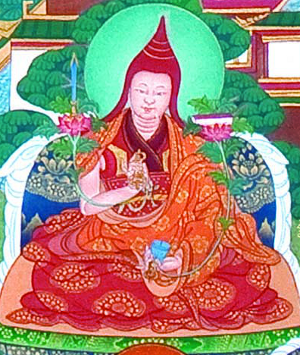Lochen Dharmashri
Jump to navigation
Jump to search

Lochen Dharmashri (Tib. ལོ་ཆེན་དྷརྨ་ཤྲཱི་, Wyl. lo chen d+harma shrI) aka Ngawang Chöpal Gyatso (Tib. ངག་དབང་ཆོས་དཔལ་རྒྱ་མཚོ་, Wyl. ngag dbang chos dpal rgya mtsho) (1654-1717) — one of the greatest scholars of the Nyingma school, whose collected writings fill twenty volumes and include important commentaries on the Guhyagarbha Tantra. He was an emanation of Yudra Nyingpo and the younger brother of Minling Terchen Gyurme Dorje, the founder of Mindroling Monastery. He was tragically killed during the Dzungar war of 1717-8, during which Mindroling was destroyed.
Writings
Commentaries on the Guhyagarbha Tantra:
- Oral Instructions of the Lord of Secrets
 དཔལ་གསང་བའི་སྙིང་པོ་དེ་ཁོ་ཉིད་ངེས་པའི་རྒྱུད་ཀྱི་རྒྱལ་པོ་སྒྱུ་འཕྲུལ་དྲྭ་བ་སྤྱི་དོན་གྱི་སྒོ་ནས་གཏན་ལ་འབེབས་པར་བྱེད་པའི་ལེགས་བཤད་གསང་བདག་ཞལ་ལུང་, dpal gsang ba'i snying po de kho nyid nges pa'i rgyud kyi rgyal po sgyu 'phrul drwa ba spyi don gyi sgo nas gtan la 'bebs par byed pa'i legs bshad gsang bdag zhal lung ff.
དཔལ་གསང་བའི་སྙིང་པོ་དེ་ཁོ་ཉིད་ངེས་པའི་རྒྱུད་ཀྱི་རྒྱལ་པོ་སྒྱུ་འཕྲུལ་དྲྭ་བ་སྤྱི་དོན་གྱི་སྒོ་ནས་གཏན་ལ་འབེབས་པར་བྱེད་པའི་ལེགས་བཤད་གསང་བདག་ཞལ་ལུང་, dpal gsang ba'i snying po de kho nyid nges pa'i rgyud kyi rgyal po sgyu 'phrul drwa ba spyi don gyi sgo nas gtan la 'bebs par byed pa'i legs bshad gsang bdag zhal lung ff.
- Ornament of the Wisdom Mind of the Lord of Secrets
 དཔལ་གསང་བའི་སྙིང་པོ་དེ་ཁོ་ཉིད་ངེས་པའི་རྒྱུད་ཀྱི་འགྲེལ་པ་གསང་བདག་དགོངས་རྒྱན་, dpal gsang ba'i snying po de kho nyid nges pa'i rgyud kyi 'grel pa gsang bdag dgongs rgyan
དཔལ་གསང་བའི་སྙིང་པོ་དེ་ཁོ་ཉིད་ངེས་པའི་རྒྱུད་ཀྱི་འགྲེལ་པ་གསང་བདག་དགོངས་རྒྱན་, dpal gsang ba'i snying po de kho nyid nges pa'i rgyud kyi 'grel pa gsang bdag dgongs rgyan
- The Illumination of the Profound Meaning, The Pith Instructions on the Method of Reciting the Sangwa Nyingpo, The Tantra of the Essence (snying po'i rgyud bklag thabs kyi man ngag zab don snang ba)
- English translation: The Illumination of the Profound Meaning, The Pith Instructions on the Method of Reciting the Sangwa Nyingpo, The Tantra of the Essence. Upon the request of Khenpo Namdrol, Lama Yeshe Nyima, with the guidance of Lopon Sonam Bumde, translated this at Olu Pua, Kawaui, Hawaii. April - May 2003.
- Colophon: The three doors of body, speech and mind, the play of deity, mantra and meditative absorption, the nature of yogic practice is the Tantra of the Profound Great Secret. Those who teach, listen, write, reciting or carry this Tantra, will be held in high regard of the Vajra Holders. Like that, after receiving the permission of the Lord of the Dharma, unequalled in kindness, Dharmashri, who received this transmission from that sublime teacher, wrote this text. This is dedicated to be the cause of benefit to beings and virtue. May there be Virtue!